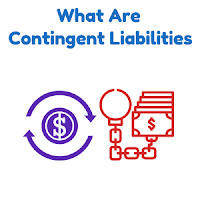What Are Contingent Liabilities - Definition - Meaning - Explanation - Example
 Contingent Liabilities are those Liabilities that arise on the happening of future uncertain event that will arise or not. The International Financial Reporting Standards clearly says that the entity shall recognize such uncertain event as Contingent Liability in Notes to the Accounts whether it will no sure that it will be happen or not. However, if there is no chance of occurring that liability i.e., there is very low probability, then
the entity should not record that liability in its financial statements.
Contingent Liabilities are those Liabilities that arise on the happening of future uncertain event that will arise or not. The International Financial Reporting Standards clearly says that the entity shall recognize such uncertain event as Contingent Liability in Notes to the Accounts whether it will no sure that it will be happen or not. However, if there is no chance of occurring that liability i.e., there is very low probability, then
the entity should not record that liability in its financial statements.In fact, the standard requires from the business a safe way according to anticipate loss but not for profit concept. If we do not follow this rule,
then our Net Profit will be overstated which will be not a good sign for the business if the profit will not happen. On the other hand, if the loss will not happen, then it will cost to us as we already accounted for it.
The example of Contingent Liability is the Legal Case. When, it is not clear whether the entity wins the case or not for the acquisition of a building or patent rights, etc. But it will
account for such Contingent Liability as it is a burden on the company to pay if the case would lost by it.
On Balance Sheet, when the Contingent Liabilities are realized then these are no longer be existed and recorded as Current Liabilities when these are used within one year and Non Current Liabilities when used for more than one year.
Comments